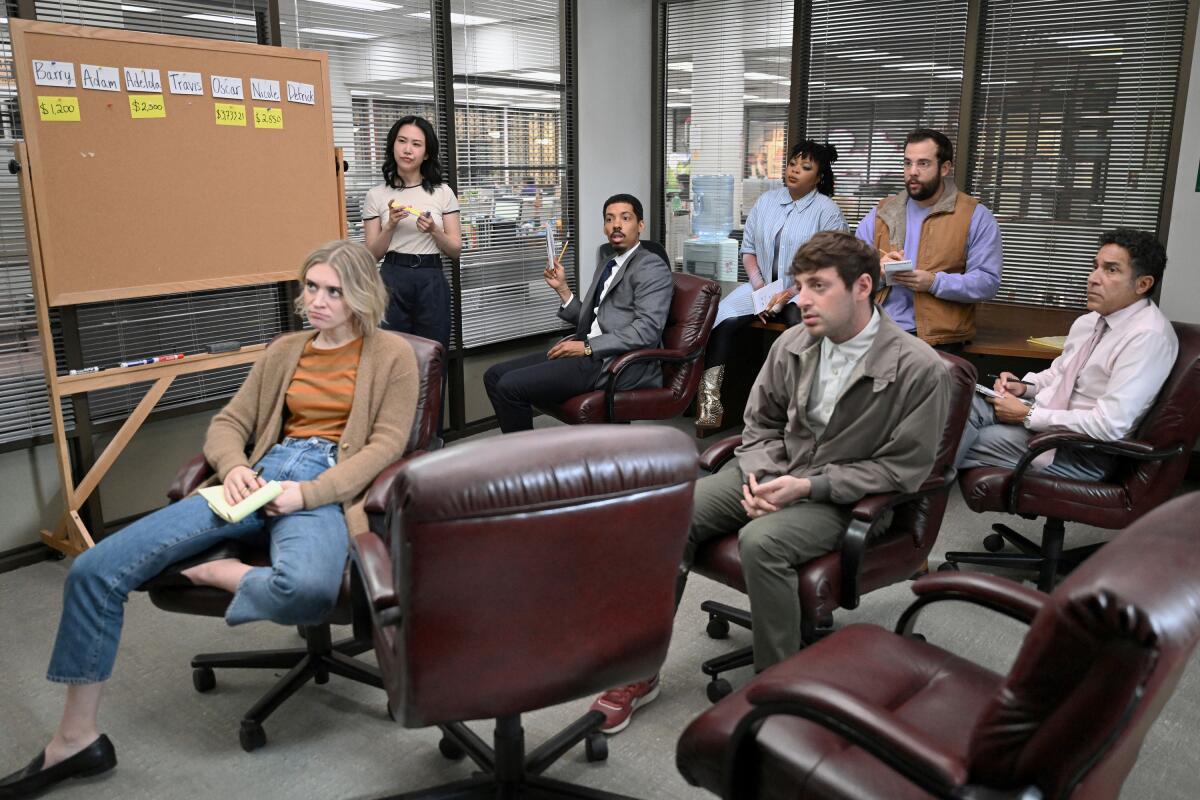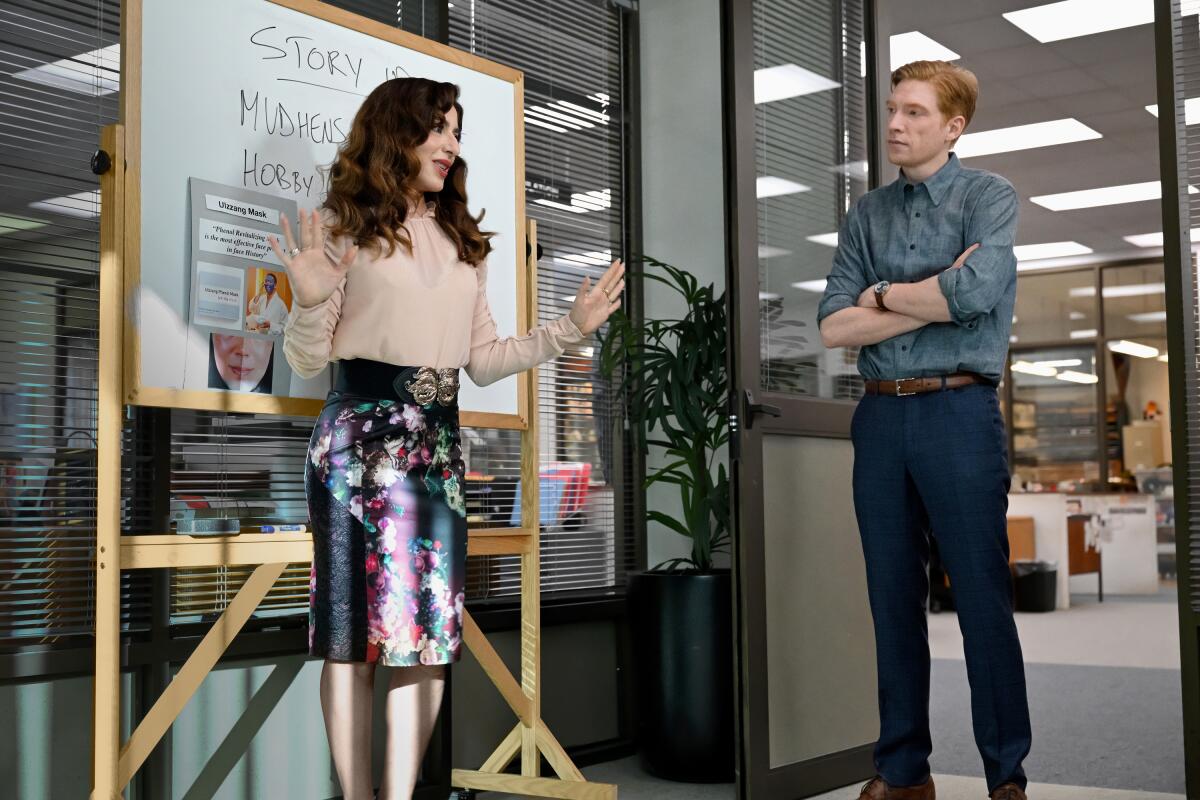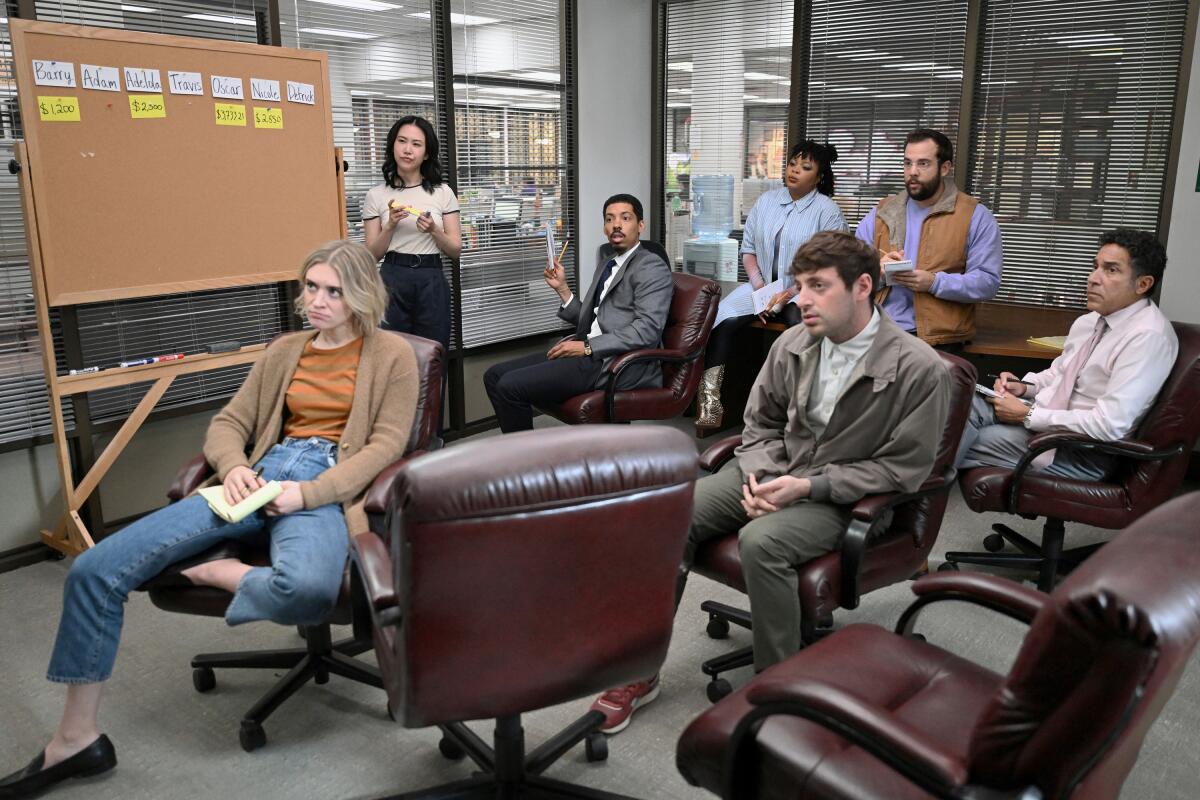“The Paper,” premiering Thursday on Peacock, is a belated spinoff of “The Office,” much as Peacock is a sort of spinoff of NBC, where the former show aired on Thursdays from 2005 to 2013. In the new series, Dunder Mifflin, the office in “The Office,” has been absorbed into a company called Enervate, which deals in office supplies, janitorial paper and local newspapers, “in order of quality.” The newspaper at hand is the Toledo Truth Teller, sharing space with the toilet paper division.
Created by “Office” developer Greg Daniels with Michael Koman, “The Paper” is shot in the same documentary style, ostensibly by the same fictional crew, and imports “Office” player Oscar Núñez as head accountant Oscar Martinez, not at all happy to be back on camera.
In the first episode, Ned Sampson (Domhnall Gleeson), a starry-eyed journalism school graduate turned cardboard salesman turned toilet paper salesman, arrives as the new editor in chief of the Truth Teller, not exactly taking charge of a staff that consists entirely of narcissistic interim managing editor Esmeralda Grand (Sabrina Impacciatore), whose sole prior media experience is as a contestant on a dating reality show called “Married at First Sight”; ad salesman Detrick Moore (Melvin Gregg); subscriptions person Nicole Lee (Ramona Young); compositor Mare Pritti (Chelsea Frei), who wrote for “Stars and Stripes”; accountants Adam Cooper (Alex Edelman) and Adelola Olofin (Gbemisola Ikumelo); and Duane Shepard Sr. as Barry Stokes, the only official reporter, whose beat consists of high school sports and falling asleep. In the sitcom logic of the show, they will all be drafted as volunteer journalists, joined by Travis Bienlien (Eric Rahill), from the toilet paper division.
Times television critic Robert Lloyd and news and culture (and former television) critic Lorraine Ali have worked in many newspaper and magazine offices between them, and come together here to discuss how “The Paper” compares to “The Office,” its journalistic veracity and whether or not it’s funny.

The journalist recruits in “The Paper,” from left: Chelsea Frei as Mare, Ramona Young as Nicole, Melvin Gregg as Detrick, Gbemisola Ikumelo as Adelola, Alex Edelman as Adam, Eric Rahill as Travis and Oscar Núñez as Oscar.
(John P. Fleenor / Peacock)
Ali: I’ll start with my favorite quote about journalism from “The Paper”: “The industry is collapsing like an old smoker’s lung.” Hack, hack, cough, I say from inside the beast. This half-hour comedy offered so many great moments of spot-on commentary about the state of legacy journalism that I wasn’t sure if I should weep or laugh. I chose the latter, most of the time. The first couple episodes are clever, funny and charmingly clumsy — if not too close to the bone for folks like us. I’ll get to the rest of the series in a minute, but how did the satire about a contracting newsroom strike you, Robert?
Lloyd: There are a couple of moments in the pilot episode where it flashes back to an old black-and-white documentary on the Truth Teller in an earlier age when 1,000 people worked for the paper, before the internet destroyed print journalism and the newspaper, which once occupied a whole building, and was eventually reduced to sharing a corner of a floor with the toilet paper division. It gave me a little shock. I feel like I caught the end of that analog era, at the L.A. Weekly, when it was a thin, then a fat alternative paper, and the Herald Examiner, where there were typewriters that must have been sitting there since the ’30s, a sort of piratical “Front Page” energy and tons of talent. (Much of which migrated to The Times when the Herald folded.)
Ali: I felt a tinge of sadness and loss watching those flashback scenes. Then they cut to present day, and the marbled halls of the once-great Truth Teller newspaper are empty. What struck me is how much the fictional paper’s lobby looked like the old Globe Lobby of the L.A. Times’ building downtown. I also got a lump in my throat when they went down into the basement where the old giant presses sat frozen. We had those relics in the old Times building too. For readers who don’t know, the L.A. Times hasn’t been in that landmark building since 2018. We’re now in El Segundo. Sounds like a great setup for a sitcom joke, right?
Lloyd: Most — all? — newspapers have felt the stress of shrinking staffs and resources, of doing more with less. But the Truth Teller starts with almost nothing — that it comes out at all, apparently daily, is something of a joke in itself; at least Ted Baxter was the only knucklehead working at WJM on “Mary Tyler Moore,” but there are more than a few of them here. “The Office” wasn’t about the work, but about surviving the environment. It didn’t really matter what did or didn’t get done. But this is a show about a business — a noble institution, however ignobly served — with deadlines, some of which one would rightly regard as impossible, having met hundreds, if not thousands, in one’s life — even without a skeleton crew that has no idea what it’s doing. But it just sort of wishes them away. Then again, it is a sitcom.
The jokes are well-timed and reliably funny, but like “The Office,” it’s all down to the characters, which are wonderful company. Oscar, of course, we already know and love. But I especially liked Gregg as the soft-edged Detrick, with an awkward crush on the wry Nicole. Ned, whom the Irish Gleeson plays like someone out of a Frank Capra pastiche, can be a little competitive, but he’s no Michael Scott; neither is he exactly Jim to Mare’s Pam, though obviously they occupy a similar position, being relatively normal and attractive. But as the One Who Needs to Be Noticed, Impacciatore’s Esmeralda does have more than a little Michael Scott in her, though turned up to 11, insanely glamorized and in an Italian accent. It’s a hilarious performance. Her delighted scrolling through a thicket of ads on a clickbait article on a tip Brad Pitt left someone is a little comic gem. It’s not unlike the way Janelle James pops out as Ava on “Abbott Elementary.”

Sabrina Impacciatore, left, plays managing editor Esmeralda, who has more than a little Michael Scott in her.
(John P. Fleenor / Peacock)
Ali: It’s impossible not to compare “The Paper” to “The Office.” It’s unfair yet inevitable, and “The Office” wins, though my favorite version of that show was the British version with Ricky Gervais and Stephen Merchant. But I do like what Gleeson does in “The Paper” with Ned Sampson, portraying him as an enthusiastic editor in chief born about 50 years too late to experience the Woodward and Bernstein glory days of print journalism. The deflated expression on his face is priceless when he advises his lost “reporters” to rely on the Five Ws of reporting, and one asks, “Is that a gang?” Gleeson has an impressive range. He was haunting as the conflicted foodie/serial killer in psychological thriller “The Patient,” where he co-starred, ironically, with Steve Carell. I also really like Young as Nicole, who I admittedly had an affinity for as a drama club nerd in “Never Have I Ever.”
My issue with “The Paper” isn’t the cast, but the pacing. It starts off strong. The first two episodes are filled with sharp writing and build a strong foundation for what we expect to see: the hilarity of an inexperienced, underdog staff turning a local rag into a real source of news. But the momentum doesn’t quite sustain. I felt myself losing interest in the story as the series progressed because their ensuing assignments, setbacks and interpersonal trajectories weren’t all that compelling.
I do, however, appreciate that “The Paper,” like “Abbott Elementary,” mines the tragic humor of a crumbling American institution while also pointing out that this thing is happening under our noses, and shouldn’t we do something — anything — to save it? Turning that tragedy into a sitcom is one answer.
